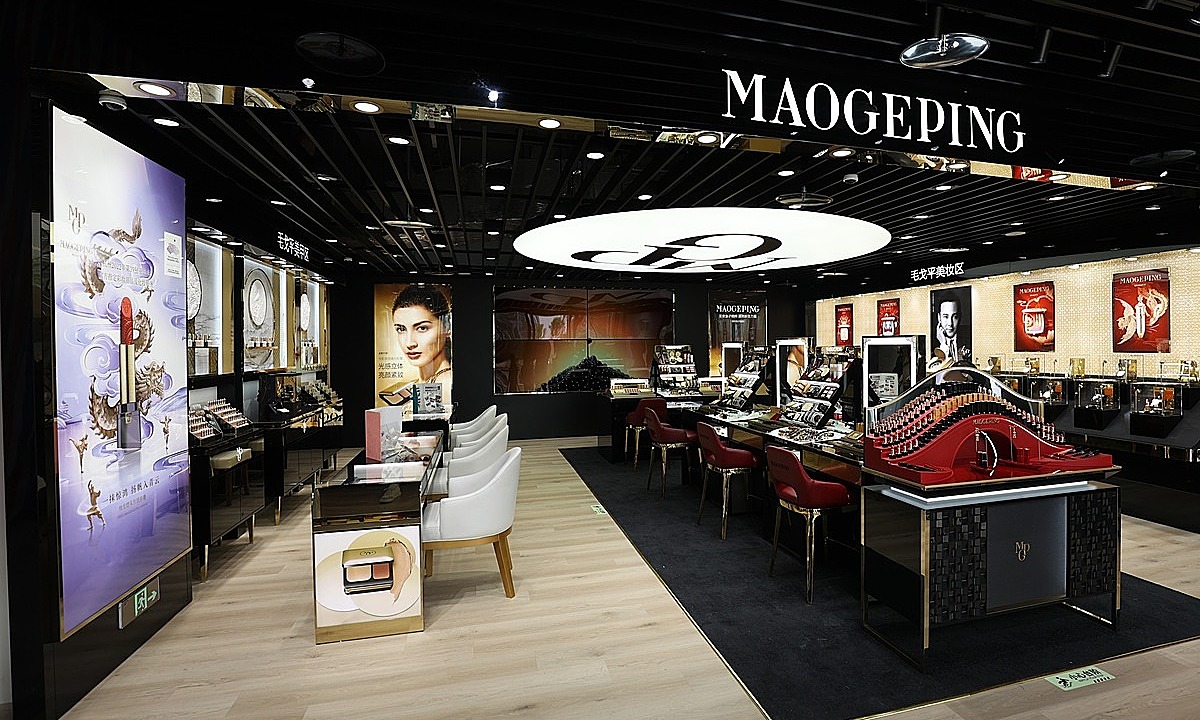Chinese high-end brands are rapidly gaining ground in their own market, surpassing international names such as Louis Vuitton and Gucci as m...

Chinese high-end brands are rapidly gaining ground in their own market, surpassing international names such as Louis Vuitton and Gucci as more consumers opt for local brands that offer more competitive pricing.
Five Chinese high-end brands in the categories of handbags, clothing, perfumes, cosmetics, and jewelry have surpassed seven international rivals in terms of sales growth over the last two years, according to data from BigOne Lab as analyzed byBloomberg News.
 |
| A Mao Geping Cosmetics shop in China. Photo provided by Mao Geping Cosmetics, |
Laopu Gold saw its e-commerce sales increase by over 1,000% in the first three quarters of this year when compared to two years ago, while Songmont's online handbag sales rose by approximately 90%.
In the meantime, online bag sales for Gucci in China decreased by over 50%, while Michael Kors' sales dropped approximately 40%.
Other regional brands, Mao Geping Cosmetics, perfumer To Summer, and the clothing label ICICLE, have all experienced comparable achievements within their respective markets.
On Tmall, China's leading online shopping platform, income for certain local brands rivals or surpasses that of international labels.
Laopu achieved US$630 million in sales on Tmall over the 12 months ending in October, whereas Van Cleef & Arpels recorded US$57 million, as reported by the consultancy Hangzhou Zhiyi Tech.
Mao Geping generated $125 million in income, surpassing twice the amount earned by Bobbi Brown. Laopu Gold's overall sales (covering both physical and digital channels) increased by 250% during the first half of this year, following a doubling in 2023 and another in 2024, as stated in its financial statements.
At the same time, Bain predicts that China's luxury market, which has been primarily controlled by European companies such as LVMH Moet Hennessy Louis Vuitton, Kering, and Burberry, experienced a decline of up to 20% in the previous year, the largest decrease since at least 2011.
The emergence of Chinese brands has drawn the interest of international competitors.
Johann Rupert, the head of Richemont, the parent company of luxury jewelry brand Cartier, was questioned in May if Laopu posed a risk.
The label is "connected to nationalism and linked to patriotism, and they have numerous advantages on their side," Rupert stated, as reported by The Wall Street Journal. However, he added, "Cartier is universal."
Even Bernard Arnault, one of the richest people globally andchairman of LVMH, visited local brand stores and purchased handbags when he was in Shanghai in September, sources saidBloomberg News.
Chinese brands have been gaining greater competitiveness by adopting a solid strategy that addresses customers' real needs.
The chairman of Laopu, Xu Gaoming, informed investors in April that the company has established a specific market position with few direct competitors.
He mentioned that Chinese gold jewelers usually aim for the general public, whereas European luxury jewelry brands do not concentrate on gold.
Price is also a significant factor in persuading high-end product customers to switch brands.
Sophia Zhang, 32, has been a loyal customer of Lancôme and Estée Lauder for years before developing an interest in Mao Geping, the eponymous brand founded by a Chinese makeup artist.
The brand's creams and foundations are usually priced at half or even less compared to similar international products. A 100-gram jar of its popular moisturizer is sold for $139, while a smaller jar of a high-end Lancôme moisturizer costs $280.
"Previously, I thought I should treat myself to skincare, thinking those well-known brands were the top choice, and I would ignore local products simply because they were more affordable," said Zhang, who added that she still buys some European brands.
Now that she's discovered a more budget-friendly alternative that suits her needs, she remarked, "it'll be hard to return."
The declining Chinese economy has reduced the demand for global luxury brands. Rather than recovering following the removal of stringent Covid restrictions, expenditure on international labels has declined.
Major luxury brands have experienced significant declines: LVMH has dropped approximately 30% from its 2023 peak, whereas Kering has fallen by about 60% since its high in Paris in 2021.
However, price is not the sole determining factor, noted Jacques Roizen, managing director of China consulting at Digital Luxury Group.
"Against popular belief, Chinese beauty brands are not focusing on cost – they are creating detailed brand worlds and emphasizing narrative," Roizen stated.
The emergence of local rivals should act as a reminder and a caution for Western high-status beauty brands.
Christine Cui, a fashion expert living in Shanghai, pointed out the growth opportunities for local handbags.
"Consumers are no longer seeking out logos, but are instead more concerned with getting good value for their money," she stated, as reported byChina Daily.
Our locally made handbags match the style and quality of global light luxury brands. If international luxury brands fail to innovate in their designs and keep focusing solely on their logos, they will surely encounter major difficulties.
For consumers like Wan Yihuan, a 30-year-old financial professional based in Shanghai, this message holds significance.
A former admirer of Hermès and Tom Ford, she now carries a $210 Songmont hobo bag and applies Mao Geping makeup.
I was caught in the trap of consumerism when I was younger," she stated. "Now I only desire things that I genuinely enjoy.



